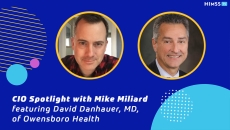Provider
The service lets clients send patients a Lyft voucher for medical transportation.
Owensboro Health CMIO Dr. David Danhauer describes how he devised a safety initiative that integrated NLP with EHR work queues – helping review and track clinical notes to ensure radiology reports are capturing incidental findings.
Its partnership with the Kingdom’s Ministry of Health marks the debut of the AVNeo in the region, making Saudi Arabia the first country from the Council to offer the advanced solution.
Sherpaa founder Jay Parkinson has left Crossover Health after two years.
The new tool will provide computer vision technology to help PTs gauge patient function.
The company says the new system will improve patient convenience and cut payer costs.
Justin Diehl, vice president of Epic services at CereCore, guides viewers through the challenges of operating multiple EHR systems.
The company will use the funding to develop remote user interaction for structural heart interventions.
SPONSORED
Twistle Medical Director Dr. John Janas says automating communication for chronically ill patients not only gives them better access to care but improves the patient-provider relationship.
The system identifies potentially dangerous lesions during colonoscopies – but is not intended to diagnose or instruct on next steps.



